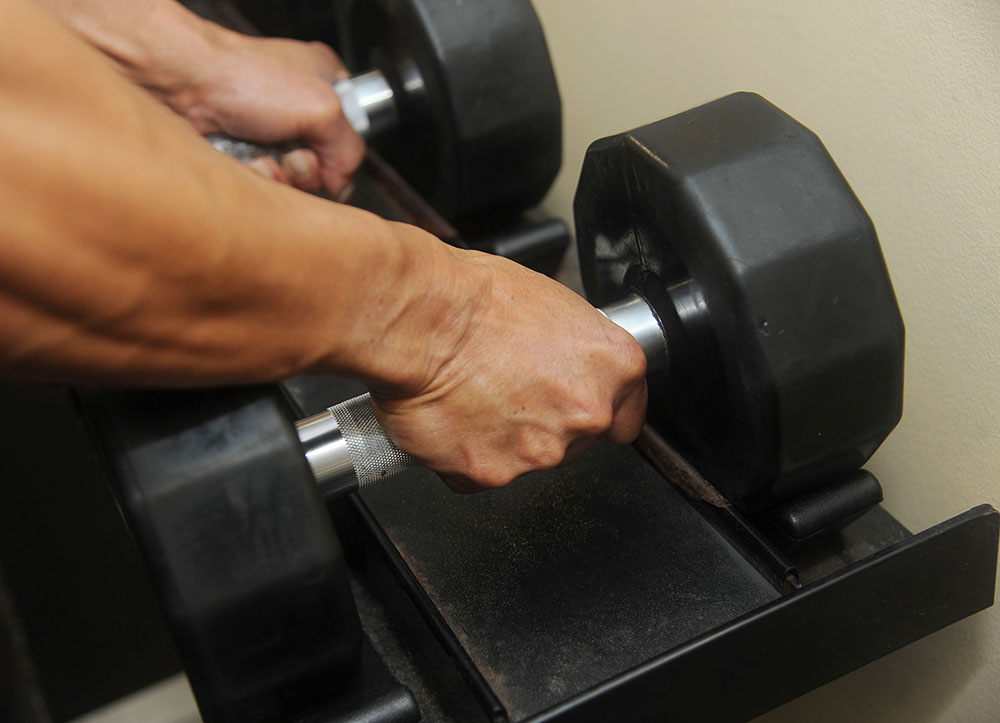By C.J. Gustafson
Dumbbell workouts have been around for many years, especially as part of weight training equipment and programs. Fad workouts and equipment have come and gone, but dumbbell workouts have remained an easy, inexpensive way to get in shape and strengthen muscles. Their reliability and effectiveness are just some of the reasons for the longevity of their popularity. Add in the fact that they take up little space and cost far less than many other types of equipment, and it becomes clear that they are a perfect choice for many fitness fans,especially as part of a home gym. There are many different dumbbell workouts that can be done at home.
Advantages of Dumbbell Workouts
Working with dumbbells has several advantages over other types of equipment that use resistance. For instance, by their very nature, dumbbell workouts require you to use stabilizing muscles that are important to strength, balance, and posture. Unlike some exercise equipment that utilizes movements that may take some getting used to, dumbbell exercises use many of the body’s natural movement patterns and also incorporate a greater range of movement than many other types of fitness equipment. And the flexibility of dumbbell workouts means that you can target specific areas of the body very effectively.
Dumbbell Safety
In addition, experts recommend that with any type of weightlifting program, you have someone spot you at all times. Spotting entails having a person who watches every step of your workout to be sure you are not overextending yourself and to provide support and encouragement at critical points. A properly executed dumbbell workout will push your muscles to their limits and even a lightweight dumbbell can hurt like heck if you drop it on your head or toe. Lastly, it is a good idea to check with your physician or fitness professional before beginning exercises if you have health concerns or have experienced an injury, especially in the back or shoulder area.
Before getting started with dumbbell weights, there are some basic safety rules to follow. As with all forms of exercise, it is best to start with some stretches or warm ups to loosen and prepare each muscle group. Failing to stretch the muscles can result in strains, tears and other injuries. It is also important to learn how to do the exercises properly, using correct form and technique before moving to heavier dumbbell weight sets and more difficult dumbbell workouts. There is a wrong way to do the exercises, and this too can result in injury or at a minimum, a lack of conditioning or effectiveness. Using a mirror helps you to see if you are using correct form.
Dumbbell Workout Exercises
When people think of dumbbell workouts, they often think of working the biceps and triceps. And in fact, dumbbells are ideal for strengthening and growing these muscle groups. However, there are exercises that incorporate dumbbells in ways that work every major muscle group in the body. The following six exercises each tackle one area of the body. They are some of the most common and easy to understand.
1.) Build those biceps
Hammer Curls – Stand straight and slightly loose with a dumbbell in each hand. Extend your arms on each side of your body with your palms facing each leg. Keep your elbows tight against your body, curl the weights up in a hammer motion and slowly return to the starting position. You can work both arms simultaneously or alternate the two. Repeat as many times as possible. Remember the goal is to fatigue the muscle.
2.) Try your triceps
Press – Lie flat on a mat or weight bench. With a dumbbell in each hand, extend your arms straight above your head, palms facing each other about two inches apart. Keep your shoulders pressed flat and avoid moving them. Bend your elbows and slowly lower the weights until your hands are on either side of your head. Push your arms back to the extended position and repeat for the desired number of reps.
3.) Shoulder the load
Shoulder Press – Can be performed sitting or standing. Sitting is recommended for beginners, as is a chair or bench with back support. With a dumbbell weight in each hand, extend your arms directly over your head, keeping elbows slightly bent to avoid locking. Slowly lower your arms until they are bent in a 90-degree angle, then push back to extended position and repeat. It is important to be sure you are pressing straight overhead as the tendency is to move at a diagonal.
4.) Best Chests
Flies – This exercise can be done lying flat or at a slight incline with back supported. With a weight in each hand, extend arms above your chest with palms facing each other. Bend your elbows slightly and be sure to keep that bend throughout the exercise. Lower your arms to either side until your upper arms are parallel with the floor. Push back to the extended position and repeat.
5.) Back to basics
Bench Rows – This exercise requires a bench set at a 30-degree incline. Adjust the height of the bench so that when you lie face down on the bench, your hands just barely touch the floor. Grab a dumbbell in each hand with your palms turned toward your feet. Bend your arm at the elbow and lift the dumbbells to your sides so that your upper arm is parallel with the ground. Slowly return the weights to the starting position and repeat.
6.) Get a leg up
Lunges – This is an exercise that is often included in an aerobics workout. Adding a dumbbell helps target the leg muscles and increases the strengthening effectiveness. Stand straight with feet about 12-18 inches apart. With a dumbbell in each hand, held at your sides, step forward with one foot, bending the knee at a 90-degree angle. Allow the other leg to bend automatically and that knee to just barely touch the floor. Push back to an upright position with the original foot and repeat. Do a set leading with the opposite foot as well, or alternate after each lunge.
These are just a few of the different dumbbell workout options. Trainers and fitness professionals have developed dumbbell exercises for all levels and situations. Dumbbells are an inexpensive, versatile way to burn calories and target specific muscle groups. They work well for people with limited space and for anyone who wants to add difficulty to an existing workout.
About the Author:
C.J. Gustafson is a successful writer for Best-Home-Gyms.com, providing consumer information and reviews on the best home gyms, strength training equipment, adjustable dumbbells and the best ab machines.


Recent Comments